TAKEAWAY: It is difficult, dangerous and even nonsensical to isolate the design process of a publication from the rest of what is happening around it.
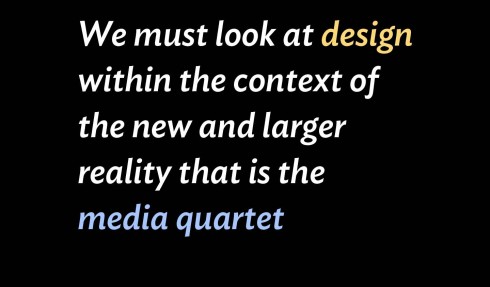
Perhaps there is nothing new about the thought in my head these days: good publication design has always been there to make content more accessible, easier to read and enjoyable to consume. Good designers never see design as a pure cosmetic exercise, whether designing a chair, an expresso demi tasse or a magazine.
Today, however, in a multi platform world, with practitioners and users journeying back and forth from one of those platforms to the other in the midst of the media quartet, one cannot approach a traditional “design project” as just that.
I, for one, refuse to engage in such a task, unless we are also looking at the rest of the operation and how the instruments play harmoniously in that quartet.
But, I also admit, many of the clients who engage our services, begin with a description of a “design project”. I guess that years of doing design work have etched our name and function in the mind of publishers as purely that of a publication designer.
Yet, this is only one portion, a third, I may add, of what we do each day with every project that comes our way.
So, while the first day briefing may start with a few sentences about the design changes the management desires, I usually nod and take the conversation to the media quartet and, indeed, how design will extend and render itself useful in each of the platforms. There is just no other way to go.
The changing role of the designer
It definitely changes the role of the designer, creates greater demands for designers, both in house and for consultants who offer their services. One does nobody a favor by simply joining silently in a project that aims for cosmetic improvements.
If you have felt the excitement of seeing a group of editors and publishers looking at a first prototype with a new look for their newspaper or magazine, just think for a moment what it is to see a room full of managers, editors, publishers and journalists who suddenly get that little push they need to take them to that place where they should be.
Suddenly the design project becomes something more. Yes, design will play a role in such a project, but as part of a much bigger moment in the evolution of that media house.
It’s an old saying that “design alone won’t do it”. The new reality is that design may represent one third of the journey in which a majority of newspapers and magazines need to embark.
The important questions
The other two thirds involve an honest appraisal that answers these five questions:
1. Where does the publication stand in terms of its offerings across the media quartet (mobile, online, print and tablet)?
2. When the editors gather for their daily planning, are they thinking of storytelling across the platforms? Or, is is still the planning of a print product?
3. Are there editors assigned to the role of editing for mobile and tablet editions?
4. Are there at least five daily stories that are presented differently across platforms, exploiting the capabilities of each platform to enhance the storytelling process?
5. Are we diligently working on the way this publication will be in 2018?
So, you see, we must look at design within the context of a new and larger reality.
At Garcia Media even our new business cards refer to us as Global Media Consulting—-of which design is a part, by the way.
Photo of the day
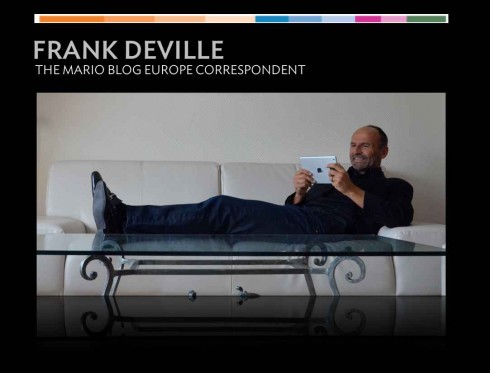
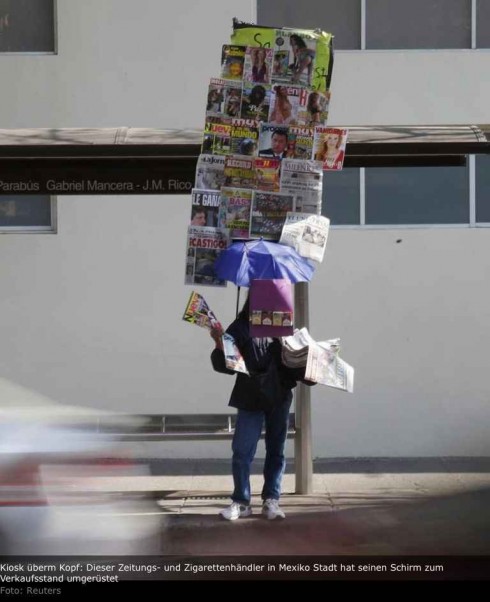
Who thinks that the printed press is not very much alive and kicking? An interesting shot from a press vendor in the streets of Mexico City, sent to us by Frank Deville, as seen in Bild.
Where’s Mario?
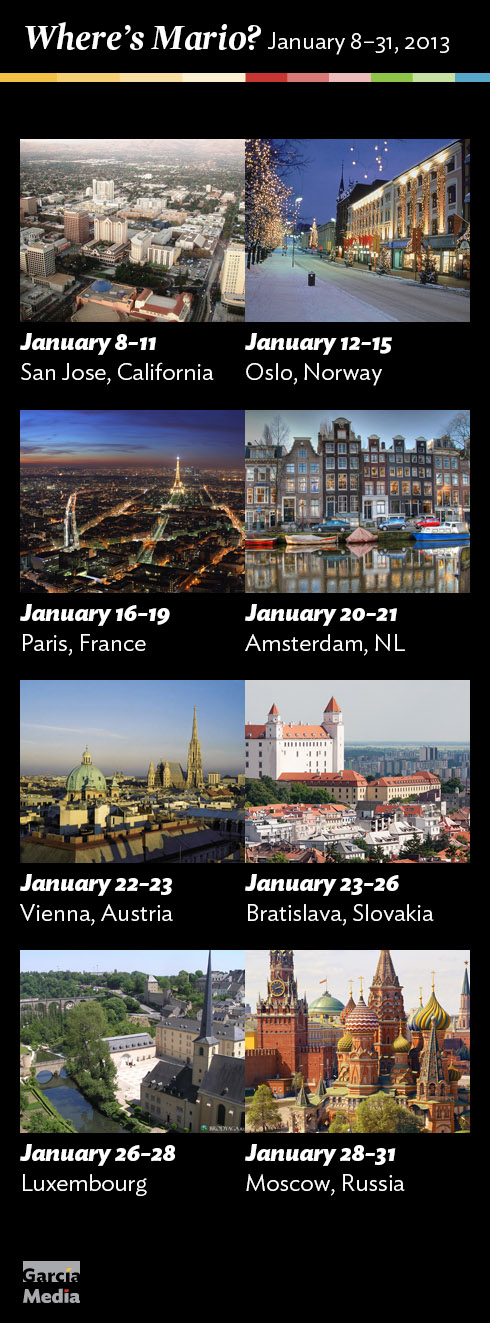
Mario’s upcoming speaking engagements
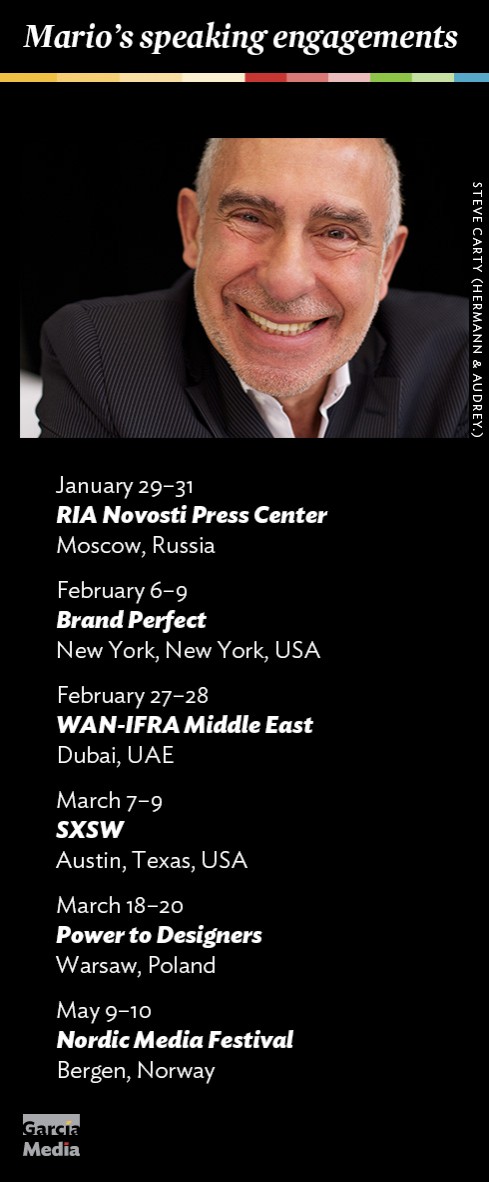
Take advantage of our iPad Design/Ad Lab workshops
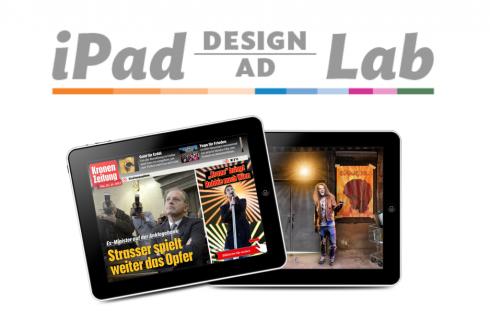
Do you want to take your brand to the next level by creating a tablet edition? Garcia Media can help. We now offer one- to two-day iPad Design Lab workshops on demand to jumpstart your presence on this exciting new platform. We also offer iPad Ad Lab workshops to develop engaging advertising models for your app. Contact us for more information.

Purchase the book on the iBookstore
iPad Design Lab has been given the QED Seal
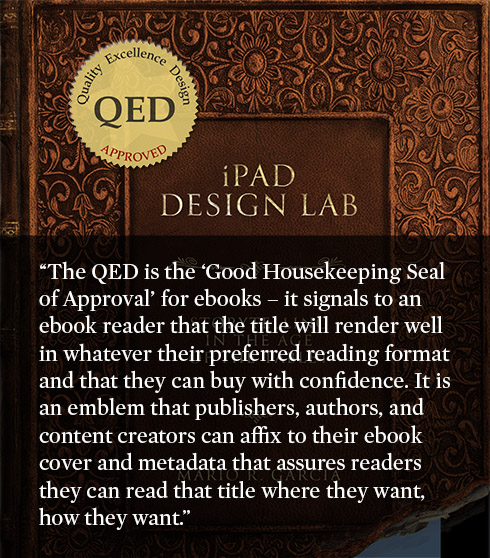
The QED (Quality–Excellence–Design) Seal is bestowed by the judges of the Publishing Innovation Awards after “a thorough, professional 13-point design review with an eye towards readability across multiple devices and in multiple formats.”
Learn more about the QED Seal here.
The EPUB version of book is HERE:
Now available: The EPUB version of  iPad Design Lab: Storytelling in the Age of the Tablet, ready for download via Amazon.com for Kindle:
http://tinyurl.com/8u99txw
Here is how you can get iPad Design Lab book:
The original version of the book is the multitouch textbook version available on the iBookstore for iPad (iOS 5.0 and up):Â https://itunes.apple.com/book/ipad-design-lab/id565672822. This version includes video walkthroughs, audio introductions to each chapter, swipeable slideshows, a glossary and a sophisticated look and feel.
Apple only sells multitouch textbooks in certain countries at this time, unfortunately. Copies are available in at least the following countries: Australia, Austria, Belgium, Canada, Finland, France, Germany, Great Britain, Greece, Italy, Latvia, Luxembourg, The Netherlands, Poland, Portugal, Romania, Slovakia, Spain, and the United States.
For those in other countries and without an iPad, we have made the book available in a basic edition for other platforms. This basic edition includes the full text of the original, along with the images and captions, but lacks the other features such as audio and video. It is available on the following platforms in many countries:
Amazon Kindle:
http://amzn.to/SlPzjZ
Google Books:
http://bit.ly/TYKcew
Take a video tour of iPad Design Lab
“iPad Design Lab” trailer on Vimeo.
Read the Society of Publication Designers’ review of The iPad Design Lab here:
http://www.spd.org/2012/10/must-read-ipad-design-lab.php

Keep up with Mario Garcia Jr.. via Garcia Interactive: helping transform online news since 1995.
www.garciainteractive.com